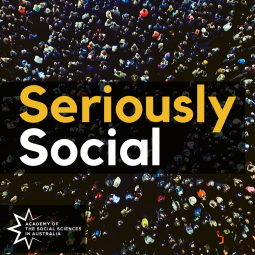
Richard Holden is an Economics Professor at University of New South Wales and a Fellow of both the Academy of Social Sciences in Australia and the Econometric Society. In E3 of Seriously Social, he helps us understand how COVID-19 is impacting Australian society through the lens of economics.
Richard along with a cohort of 250 other economists recently wrote a letter to the Australian government titled: ‘Don’t Sacrifice Health for the Economy’ – a surprising refrain from experts in their field. “One of the things that economists get kind of a bad name for, and it’s our own fault, is being seen as sort of cold and calculating,” says Richard, who argues that you cannot have a fully functioning economy in the midst of an uncontrolled health crisis.
 Here’s the TLDR from his fascinating conversation with podcast host Ginger Gorman and you can listen to the full episode at seriouslysocialpodcast.org.au or on your favourite podcast platform.
Here’s the TLDR from his fascinating conversation with podcast host Ginger Gorman and you can listen to the full episode at seriouslysocialpodcast.org.au or on your favourite podcast platform.
1. You can’t trade-off public health for the economy.
“If you have a public health crisis, an exponential outbreak of a very infectious and deadly disease like COVID-19 is, then you’re not going to have a functional economy until you’ve got that under control. In the short run, you shouldn’t really be thinking about a trade-off between the economy and public health. You should be thinking about getting the public health crisis under control and then you can focus, once various measures are in place, on relaxing the social distancing provisions and getting the economy back to some kind of shape.”
2. Containing coronavirus is an investment in the economy.
“That’s what we’re pushing back on, this false dichotomy between a perfect functioning economy like it used to be and some kind of lockdown that helps save lives. I really think that painting it as this false dichotomy that has been created between the economy and public health, as if they were the only two options is very dangerous. I prefer to think about it as what economists call and intertemporal trade off, a trade off over time. So, what we’re doing now is we’re making essentially an investment in the economy for the future by enacting some of these containment measures today.”

3. Now is not the time to relax social distancing.
Calls for relaxing of social distancing measures are premature. One of the things that these voices confuse, and it’s really a bad flaw of logic, is they look at our body count and our infection rate, and they say, “See, it’s not nearly as bad as it was overseas, so we don’t need these measures.” And of course, it’s not nearly as bad as overseas precisely because we have taken these measures.
And so, it’s rather like saying, “We have a lot of police on the beat and we have a relatively low crime rate. So, look at the low crime rate, we don’t need all the police on the beat. We could save the money.” And of course, if you put it that way, which is precisely analogous, everyone would say, “Well, that’s a crazy suggestion. You’ve got to think about what would happen absent of the police.”
4. Government relief packages are not driving the books into irreversible levels of debt.
“The economic effects are really, really serious, but the economic effects will be even worse if we don’t get the public health crisis under control. Economic lessons from history, such as the Great Depression, have shown the need for enacting immediate measures to help small businesses and individuals, and the Federal Government has acted incredibly responsively and very decisively, with $200 billion worth of spending measures. And our ability to service the JobKeeper and Jobseeker loans is very strong, given both low interest rates and our ingoing position of having one of the lowest ratios of net debt to GDP among all advanced economies.”

5. Those who don’t download the COVIDSafe track and trace app are being selfish.
“When social distancing provisions are relaxed, we’re going to see almost surely some kind of infections spike at that point. Firstly, you’ve got to know that people are infected. That’s why testing is really key. Secondly, you’ve got to know who they’ve been in contact with and so who they might have infected so that those people can go get tested really quickly.
And you’re not going to be able to do that on a large scale with a bunch of public health officials running around with clipboards trying to track where people go or ask people to keep diaries of where they go. Those are the sorts of things you’d do if we didn’t have fancy technology, but we do have fancy technology.
The overwhelming majority of Australians have a mobile phone. Those phones have Bluetooth technology. That signal can tell you how long you’ve spent in what intensity of proximity with other people who have a phone with that Bluetooth capability. And that’s what this app does and that’s incredibly powerful.”
6. There is an upside to the pandemic.
“COVID-19 will cause us to re examine and modify our economic model in ways that will make us all better off.”